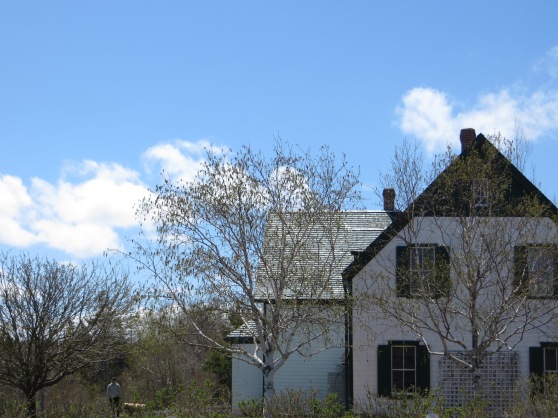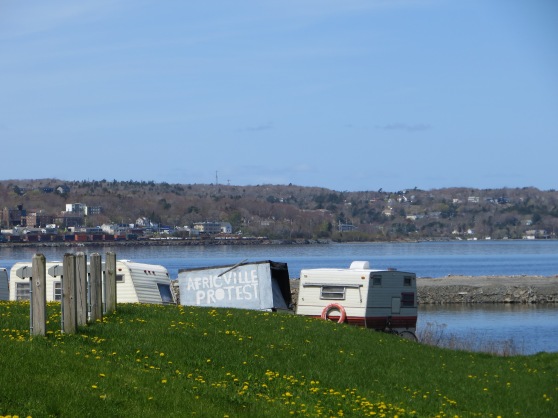One of the reasons I encourage everyone (especially students) to travel is because traveling, I’ve found, helps you to discover yourself; and my latest adventure – to the East coast of Canada – proved just that.
Since calling this country my home, I have longed to visit Nova Scotia, Prince Edward Island and other must-sees of the Atlantic. Still, it took the end of a master’s degree and a need for something new and inspiring to push me over the edge and towards the other side.

Point Prim Lighthouse, Point Prim Road, PEI.
Halifax, Nova Scotia and Charlottetown, Prince Edward Island are capital cities for a reason. Both tell the stories of the greater pieces of land they represent all too well: Halifax, a bustling city, guarding the history of many cultures beyond its surface; and Charlottetown, as quaint as it gets in the best way possible, and the tip of the iceberg of a beautiful island.
In addition to the change of scenery, the timing of this trip coincided with a very deep train of thought that took over my mind: what is the meaning of life?
Without much explanation, once my studies terminated, I began to contemplate the point of it all: the purpose of living; a reason for having dreams and goals if, at some point, life ends anyways. Very morbid to say the least, but I thought a getaway from my current world of endless job applications would help me find an answer. And surprisingly, it did.
What helped me find that answer was a brilliant non-fiction book I purchased before my departure called, Man’s Search For Meaning, by Viktor E. Frankl. In it, Frankl describes his time during WWII in Auschwitz, the people and things he lost while there, and the power and inner strength he relied on to survive inside the camps and later, back in the world. There were so many quotable parts of the book, so many “ah-ha” moments that I wish I could copy and paste here. But a few of them really stood out, not just for their message, but also how they seemed to coincide effortlessly with my travel discoveries:
“By declaring that man is responsible and must actualize the potential meaning of his life, I wish to stress that the true meaning of life is to be discovered in the world rather than within man or his own psyche”.
Charlottetown taught me quite well that our purpose lies beyond the interior. The quaintness of the city is lovely but limited. Eventually, we rented a car and immediately experienced the benefits of going beyond our (financial) limits. Point Prim lighthouse, Anne of Green Gables, Brackley Beach, and Cow’s Creamery – we saw so much! Even better was the fact that our trip took place at the cusp of tourism season; so it felt like we had the entire island to ourselves! Bliss.

Anne of Green Gables, North Coast, PEI.
“We can discover [meaning in life] by creating a work or doing a deed”.
I saw the purpose and passion of a community – Africville, Halifax, one of the oldest settlements of Black Loyalists and freed peoples in Canada – in the fight for land ownership and cultural reclamation.

Map of Africville, 1964, Africville Musem, Africville, Halifax.
In 1958, the Halifax government began a process of forcibly removing Africville residents to use the land – located by ideal waterways – for commercial industry and transport uses (one tactic included placing a garbage dump right by the community). Though most residents have now left the area, one resident remains: Mr. Eddie Carvery, a former resident of Africville, has continued to protest the extradition of his community for decades since its redevelopment. On entering the on-site Africville Museum (which is highly inaccessible due to negligence by the City of Halifax), it’s hard not to notice the big sign that reads “AFRICVILLE PROTEST” in all white letters.

Just outside Africville Museum, Africville, Halifax.
Finally, love.
Of course, Frankl spoke of love, one of the most powerful qualities of life that continues to pull us through:
“The more one forgets himself – by giving himself to a cause to serve or another person to love – the more human he is.”
Relating back to the first quote, one can find meaning outside of themselves, either through a cause (like Africville) or a person. I traveled to clear my mind, yet from that, I also realized that the world is much bigger than me. There are so many other people on this Earth that are familiar only with their own lives, their own community and their own problems. Traveling exposes us to other cultures, other people and other hardships unlike our own. It creates space for patience, understanding, empathy … and love.
Since finishing Frankl’s book, I’ve had several conversations about this heavy question with close family and friends – some of whom have lost loved ones or come close to losing their own life – and for the most part, it seems everyone is still trying to figure it all out.
The Maritimes is a heavenly part of the greater beauty that is Canada and, over other adventures, it’s surprising to learn what you can discover in your own backyard. There is meaning outside ourselves and in the world. And there is purpose in one’s passion for a cause or one’s love for another. Eddie Carvery found his.
And I continue to find mine.
À la prochaine,
Moi
Music of the Moment: